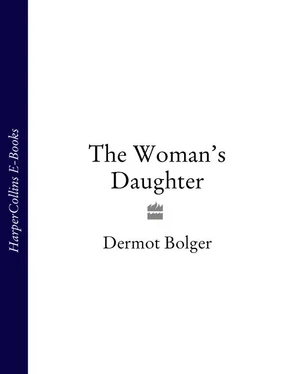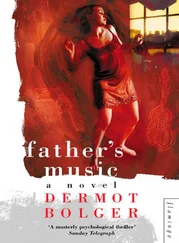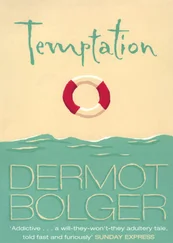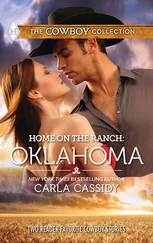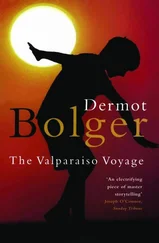Dermot Bolger - The Woman’s Daughter
Здесь есть возможность читать онлайн «Dermot Bolger - The Woman’s Daughter» — ознакомительный отрывок электронной книги совершенно бесплатно, а после прочтения отрывка купить полную версию. В некоторых случаях можно слушать аудио, скачать через торрент в формате fb2 и присутствует краткое содержание. Жанр: unrecognised, на английском языке. Описание произведения, (предисловие) а так же отзывы посетителей доступны на портале библиотеки ЛибКат.
- Название:The Woman’s Daughter
- Автор:
- Жанр:
- Год:неизвестен
- ISBN:нет данных
- Рейтинг книги:4 / 5. Голосов: 1
-
Избранное:Добавить в избранное
- Отзывы:
-
Ваша оценка:
- 80
- 1
- 2
- 3
- 4
- 5
The Woman’s Daughter: краткое содержание, описание и аннотация
Предлагаем к чтению аннотацию, описание, краткое содержание или предисловие (зависит от того, что написал сам автор книги «The Woman’s Daughter»). Если вы не нашли необходимую информацию о книге — напишите в комментариях, мы постараемся отыскать её.
The Woman’s Daughter — читать онлайн ознакомительный отрывок
Ниже представлен текст книги, разбитый по страницам. Система сохранения места последней прочитанной страницы, позволяет с удобством читать онлайн бесплатно книгу «The Woman’s Daughter», без необходимости каждый раз заново искать на чём Вы остановились. Поставьте закладку, и сможете в любой момент перейти на страницу, на которой закончили чтение.
Интервал:
Закладка:
Don’t stare at me like that, you frighten me with those eyes. They’ve gone now, I tell you, they’ll never harm you. I’ve always looked after you, you know I always will. Don’t move away from me again, come back daughter, come here like you used to, do you remember? Take down your dress and rock in my arms the way you loved to when you were small. And I’ll tell you a story; I’ll tell you how we came here, me and Johnny and Mammy and Daddy.
We were all up on top of a huge open lorry and Daddy was cursing because he couldn’t get the rope to fit around it. There was a crowd of neighbours from Rutland Street gathered around the lorry and he’d bought a bag of Lemon’s boiled sweets for all my friends even though it wasn’t Saturday. They kept jumping up and waving at me until I felt like a film star, and then Daddy climbed in beside the driver and with a big black puff of smoke we moved off with the children running behind and old Mrs O’Byrne from the same landing leaning out of her window and calling to my mother who was sitting on one of the new chairs.
We drove away up the North Circular Road with Johnny and myself clasping our hands under the chairs to keep from falling off, past Doyle’s Corner until we came over Cross Guns Bridge and saw the big flashing lock of the canal at the flour mill where that woman was murdered, and then out past the orphanage where all the boys in short trousers with their hair cropped like convicts raced over to the tall railings to stare at us and shout at Johnny, and then along by the grey stone wall with the towers till we reached the railings of the cemetery. That scared me when I saw it first, with those carved out tombs of priests and bishops just within the walls covering the bones of figures stretched out in stone, and the big crowd of sombre mourners waiting for some hearse. And then we reached the countryside with the big houses set in their own grounds across from the graveyard and the road sweeping down towards the stone bridge with a pub where the wood began.
We swung left there and up that hill where there was a little row of small cottages and a country lane leading down to the back of the dairy. It felt like we were out in Meath or Wicklow. And then the truck swung left again into an uneven road and we had to grip the chairs tight to cling on. And as I swung my head round to see this street with muck and stones from the builders all over the road and every second house still empty, I got so excited I almost cried out with so much space everywhere.
Another crowd gathered when the lorry pulled up, but this time nobody waved to us. Instead the children stared silently from the doorways or called backwards to their parents inside. My father got out and I could see he was angry. He stood looking up at the furniture as if he wanted to bundle it all up under his coat and run inside.
‘We should have waited for darkness,’ he said, ‘to get the stuff into the house.’ He carefully avoided the watching eyes as he hauled at the ropes, only intent on trying to save his pride.
My mother was different. She climbed down from the truck and stood there brushing her hands as if every detail of the street was to be savoured like a prize. A neighbouring woman approached her and with a careless wave of her hair she was gone off to drink tea in a kitchen. Some of the children came closer and craned their necks to gaze up.
‘Oi, headtheball, where’d ya get the sister?’ one boy shouted and they all laughed. Johnny sat with his feet swinging over the edge of the lorry talking to them. He jumped down to join the crowd as they moved off and called to me over his shoulder. But even though I wanted to follow, I stayed there expecting him to turn again or stop and call for me, but he never bothered and they all just ran on with their feet scrambling for a kick at a small plastic ball.
My father and the driver were working without ever exchanging a word, shifting piece after piece of furniture in through the hall door. After a while, the driver stopped as if asserting his independence and offered Daddy a cigarette. They stood in the doorway silently smoking. The winter twilight was coming in, dragging a cold mist down with it.
I walked past them into the hall and climbed the bare stairs to the top step. This is my step, I thought, this is my house. I said it over and over again as if I couldn’t believe that other floors weren’t built on top of it and people would not keep tramping up and down to them. And as I sat up there on that floorboard in the darkness, gazing down with a strange sense of pride at the bare circle of light in the hall, it seemed as if a child’s bony fingers reached out to pinch my back from the empty landing behind me. I never turned my head, I sat perfectly still, watching the backs of the two men as they bent beneath their loads, and listening to the echo of their boots retreating down the concrete path.
Every morning the same; the monotonous meals prepared and carried upstairs, the silence when they sat, the manic cheerfulness of the woman’s voice as she unveiled the small tokens of gossip and snatches of conversation she spends her day inventing to carry home like worms in her beak. And then the irretrievable silence settling like dust in the room when the train of lies slows to a halt and there is nothing left to make of the day. Then sometimes, like now, the story will begin, narrated over and over, part by part, as if some key that had been mislaid in all the other tellings might suddenly glint in the light of this one. Again and again the faces, the actions, the voices of this house, as if the recounting could somehow exorcize them. Always she begins it for the girl whose mute eyes show no recognition. Always she finishes it for herself as if only the chain of memories sustained her.
The sitting-room was always cold, no matter if you lit a fire. You could put a glass of ice beside the heater and it wouldn’t melt. At first Johnny would never go upstairs by himself. I’d find him alone in the hall and he’d take my hand even though I was smaller. We’d ascend, step by step, always expecting to find white eyes staring at us through the banisters. And then we’d stand at the top feeling foolish, confronted only by three white doors. At night we often heard the sitting-room door slam, even after Daddy had carefully locked it.
The priest came at dusk in a long black cloak and my arms ached from helping Mammy to scrub the lino clean. We knelt in a circle with beads in our hands while he blessed the house in Latin. He took out a framed picture of the Pope and wrote our details in the slots below it, and we hung it across the room from the Sacred Heart lamp. The sitting-room door never banged any more. It was always kept locked and only used for visitors. Even now, I’m frightened before I open that door, as if Mammy and Daddy are still kneeling there, the beads in their hands criss-crossed by cobwebs.
This is the spot where the archers’ horses paused first by the stream. They shook their manes that were caked with mud and lowered their noses towards the water. The King rode past with his lieutenants and stopped to examine the ancient trees which the saint had planted there. Sunlight quivered through the thick foliage and sparkled upon the axes the foreigners carried by their sides. Here where two streams met, a mile from the village, they made their camp in the woods. The axes bit into the trunks, the sap ran over the blade. They fell with a loud crackling of limbs. The beech trees and the yew were sliced and shaped into arrows, the ash was bent into long bows. Campfires flickered through the dense forest where peasants watched from the shelter of bushes. Scouts rode back and forth from the walls of the Pale, rabbits bolted into burrows between the roots of trees.
An archer shivers and cries in his sleep, the friends who bury him catch his inheritance. Plague runs swiftly through the ranks, delirious strangers shiver among brambles and day lilies as they await death. On the hillside above the rivulet, Henry surveys the trench being dug. Clad in mail the bodies tumble down, some of them still breathing. The horsemen ride towards the coast, the peasants come out to stand in the clearing. They run the white shavings of ash and yew between their fingers. A summer breeze blows down from the north, the limbs of the sacred trees bow their heads secretively.
Читать дальшеИнтервал:
Закладка:
Похожие книги на «The Woman’s Daughter»
Представляем Вашему вниманию похожие книги на «The Woman’s Daughter» списком для выбора. Мы отобрали схожую по названию и смыслу литературу в надежде предоставить читателям больше вариантов отыскать новые, интересные, ещё непрочитанные произведения.
Обсуждение, отзывы о книге «The Woman’s Daughter» и просто собственные мнения читателей. Оставьте ваши комментарии, напишите, что Вы думаете о произведении, его смысле или главных героях. Укажите что конкретно понравилось, а что нет, и почему Вы так считаете.
